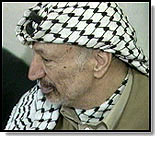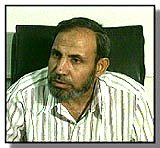
|
|
Arafat is reluctant to crack down on Hamas
|
Arafat Opens Talks With Hamas
Despite strong protests from Israel, Palestinian President Yasser Arafat has opened a two-day dialogue between the Palestinian Authority and the Islamist opposition, including the militant Hamas organisation.
In the wake of the 30 July double suicide bombing of a Jerusalem market, Israel demanded that Mr Arafat crack down upon Hamas and similar groups. The Israelis also introduced tough measures against the Palestinian territories, sealing the border with the West Bank and Gaza Strip.
David Bar Illan, a senior advisor to Israeli Prime Minister Binyamin Netanyahu, slammed Mr Arafat's decision to hold the talks. "This is completely the opposite of what they should be doing. Instead of dismantling the terrorist groups, they are trying to placate them," Mr Bar Illan said.
Mr Bar Illan warned that Israel may not now transfer the rest of the tax refunds it owes the Palestinian Authority. The transfers were frozen after the Jerusalem bombings, although some of the money was paid last week after the United States protested to the Israeli government.
The head of Israeli military intelligence, General Moshe Ya'alon, accused Mr Arafat of using the meeting to plan "spontaneous popular violence" against Israel.
Mr Arafat appears to have ruled out crushing the Islamists. Although the Palestinian President can call on 30,000 armed men, he fears that repression against Hamas could backfire. Hamas is steadily gaining in popularity among Palestinians, because of the economic hardship resulting from Israel's border closure and the frustration at the deadlock in peace talks.
Nabil Sha'ath, the senior Palestinian negotiator with Israel, said the meeting aimed to create "national unity and political consensus". Mr Sha'ath said: "This is a very important part of democracy. It is very necessary during this time of difficulty, a time when we are determined to save the peace process."

|
|
Mahmoud Zahar: "Israel does not belong to this area"
|
However, Hamas is focusing not on the peace process but upon resistance against Israel. "We say that the option of resistance in al its forms is the true option to regain our rights from Israel," said Hamas spokesman Abdel Aziz Rantisi.
A Hamas leader, Dr Mahmoud Zahar, was even more blunt in an interview with the BBC. "Israel is a foreign body. Israel does not belong to this area," he said.
Israeli planes bomb Lebanon
Meanwhile, Israeli war planes have bombed positions under the control of Islamist Hizbollah guerillas in Lebanon, in retaliation for Tuesday's rocket attacks against northern Israel. The first strikes took place in the Beka'a Valley. An Israeli military spokesman said that the planes had also fired at an electricity pylon near the port city of Sidon.
Israel has also warned the Lebanese government that it must act to curb Hizbollah's activities. For its part, Lebanon has accused Israel of targeting civilians, in a violation of a 1996 ceasefire.

|


